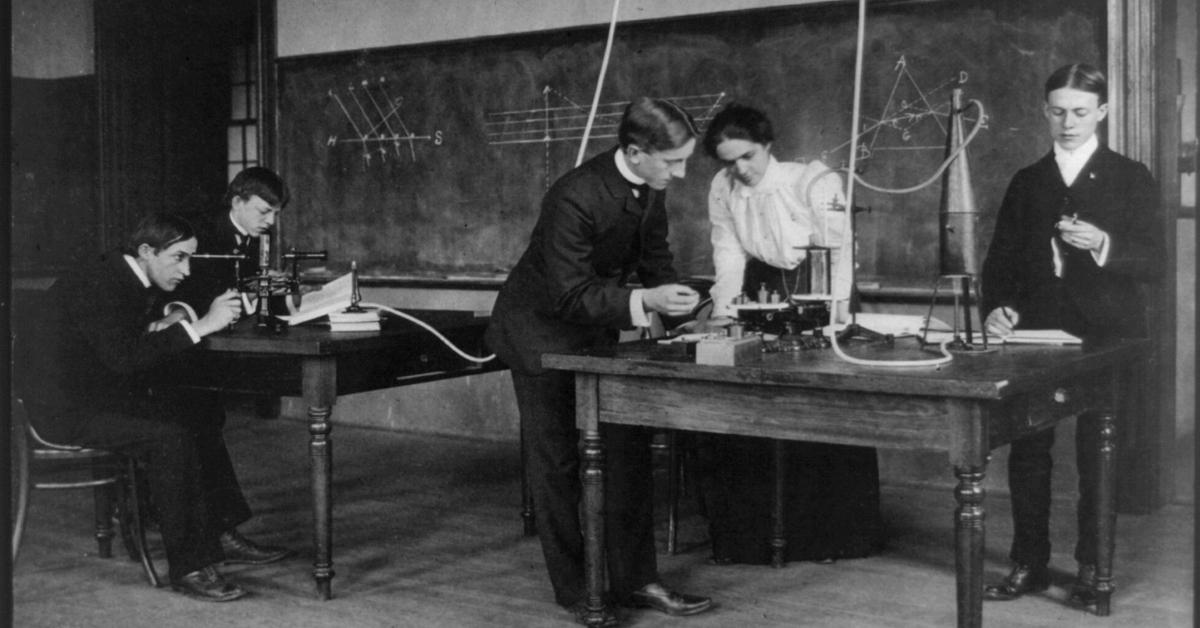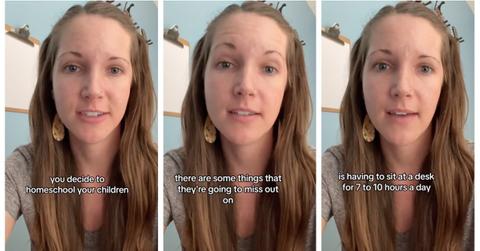What Do Homeschooled Kids Miss out On? Not Much, Says Former Public School Teacher
Published Oct. 3 2023, 6:23 p.m. ET
I know a lot of people who were homeschooled, and as adults, they joke about how weird they've become because of it. These people are my friends and I don't find them strange at all, at least not in any sort of upsetting way. I have no doubt in my mind that some people are kept home for reasons that can feel deeply unfair to children. However, times have definitely changed.
The rise of social media has undoubtedly caused more stress and anxiety in schools. I feel so deeply for kids who can no longer hide from their tormenters once the school bell rings. Like most things in life, I'm sure homeschooling has evolved into something more thoughtful. According to TikTok user The Mindfull Mentor, a public-educator-turned-homeschool-teacher, there isn't much a kid will miss by being taught at home. Hey, if we can work remotely why can't we learn remotely too?

Students in a classroom
Homeschool kids get to move around here.
As The Mindfull Mentor pointed out, being in a public school involves sitting at a desk for six to seven hours a day. This is not limited to middle school or high school aged kids. Even younger children in elementary school spend several hours a day sitting down, working from a desk.
Unfortunately, there isn't much help outside of actual classroom time. Kid are of course sitting in a cafeteria during their lunch break, and recess is reserved for students below sixth grade. By the way, most recesses last for about 30 minutes.
If you think the sitting stops at school, don't forget homework. Of course, The Mindfull Mentor wasn't quite right here. She claimed students are getting homework from every class, which adds up to "two to three hours of homework per night."
It's possible she's getting this misinformation from a study done by "Challenge Success, a nonprofit organization that works on identifying problems and implementing best practices in schools," via The Washington Post. This study was limited to students in "high-performing" schools, a piece of information that was often left out by the media who covered it.
On average, students get about 50 minutes of homework per night. This begs the question, does homework actually help? The answer varies. Popular Science reported that "in the mid-2000s, a Duke researcher named Harris Cooper led up one of the most comprehensive looks at homework efficacy to-date."
While there did appear to be a vague correlation between homework and improved studies, Harris later told the National Education Association in an interview that the kids who achieve more were already high-achieving. In other words, they were already on the path of improvement.
What about socialization? One concern about homeschooling a lot of parents have is children will miss out on connecting with their peers. To that I say, have you seen how mean kids can be? Honestly, they are terrifying. What if you could learn and socialize with the family pet?

School is tough
In all seriousness, The Mindfull Mentor addresses this in another TikTok. As a reminder, she was a public school teacher and as such she did not clock a lot of socialization in schools. I wouldn't be surprised if most communication is done via phones nowadays, which is a different problem altogether.
Like me, she references how cruel kids can be to each other. Per Pacer.org, one out every five students reports being bullied. And those are just the students who actually speak up. I can't fathom how many stay quiet. Of those who actually speak up, 41 percent believe it could happen again.
A few parents popped into the comments in order to shed light on what being homeschool has done for their children. "My son became more social after we started homeschooling," wrote one person. "He's more confident and far less insecure." One mom said her son is actually more sociable now. Once the pressures of fitting in is removed from the equation, it seems like some kids just get to feel better.
